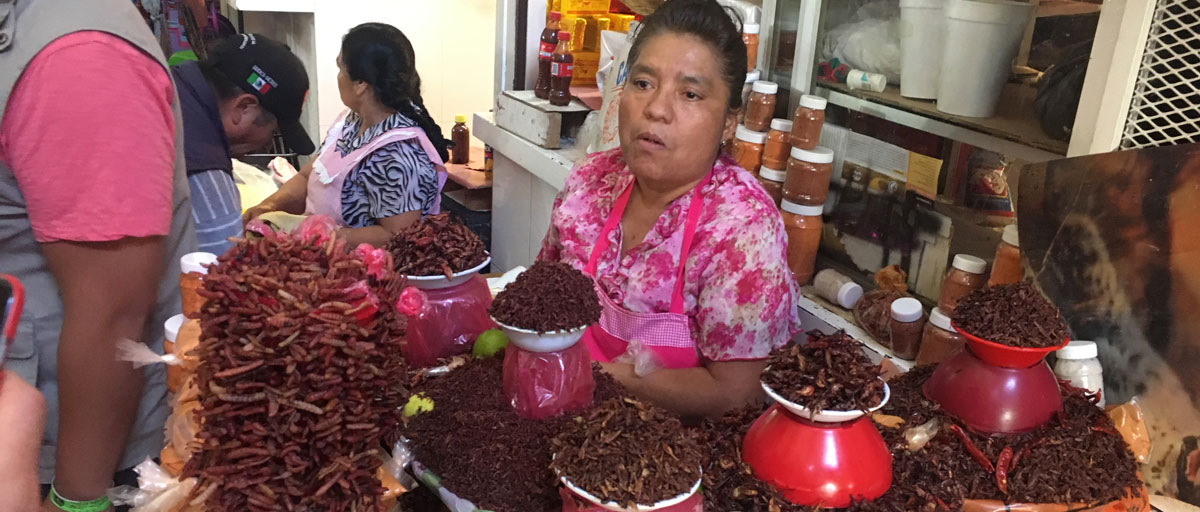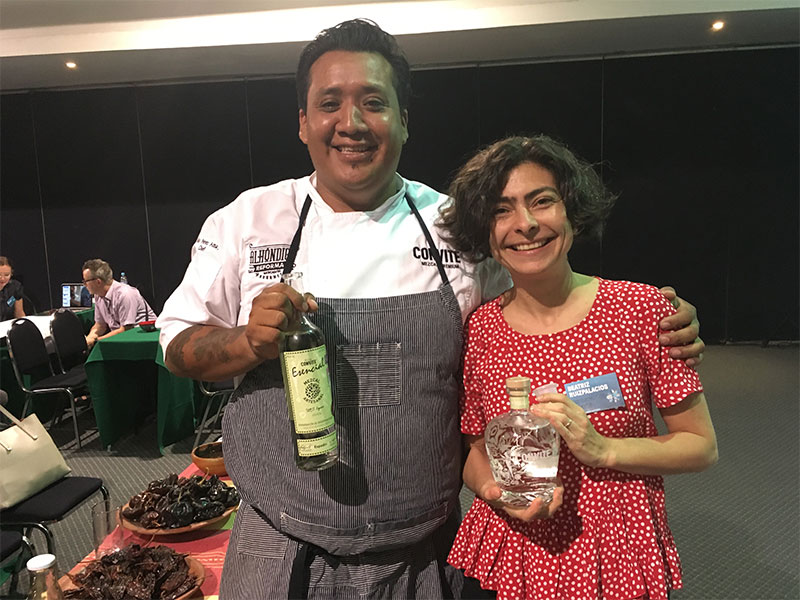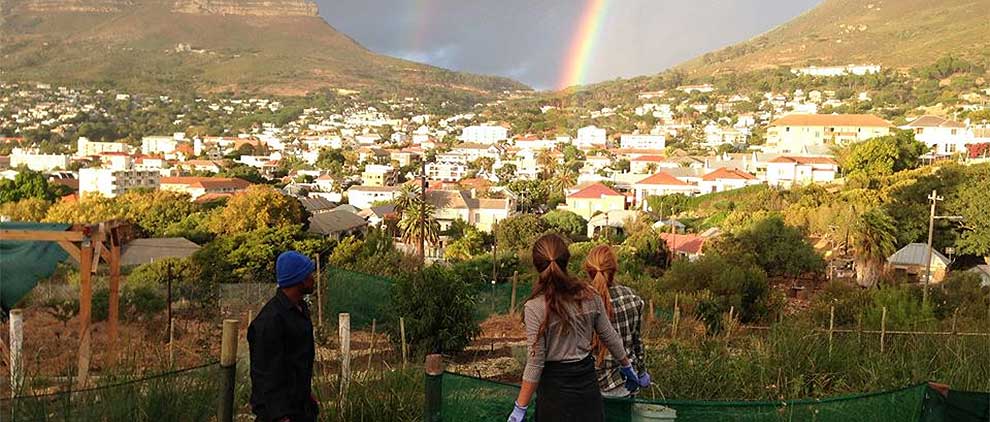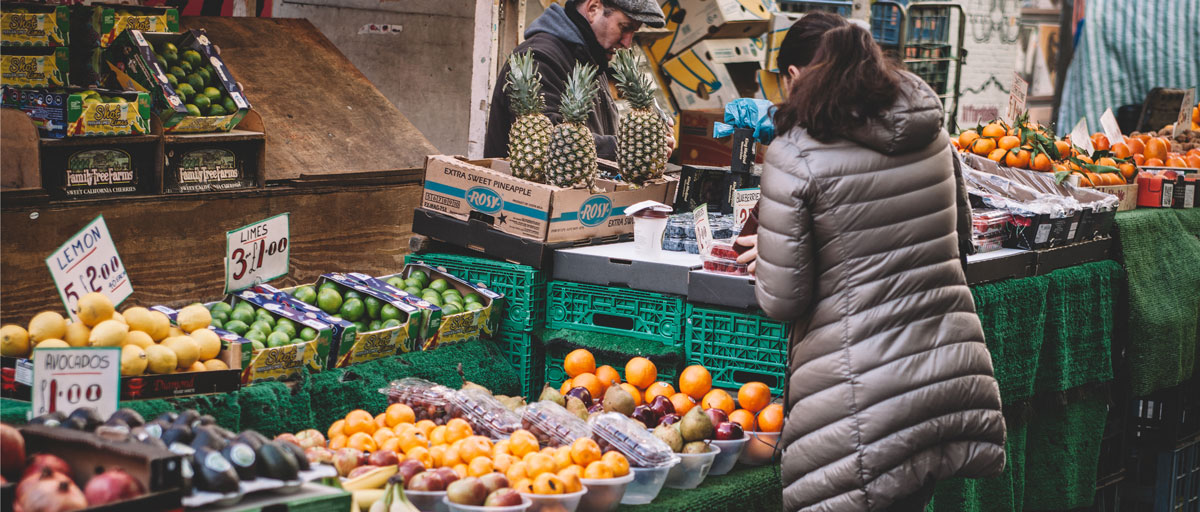
A woman at the Mercado Benito Juarez in Oaxaca selling edible insects, including the famous Mexican grasshoppers or 'chapulines'. Researchers argue that traditional, local food knowledge might be the unexpected ingredient that can transform the food system to become more sustainable. Chefs and cooks can become key changemakers. Photo: L. Pereira
Bildtext får vara max två rader text. Hela texten ska högerjusteras om den bara ska innehålla fotobyline! Photo: B. Christensen/Azote
SUSTAINABLE FOOD PRODUCTION
A delicious transformation
Proof might really be found in the pudding. Chefs can be key changemakers in a sustainable transformation of our food system
- Local traditional food can promote biodiversity, preserve traditional knowledge, and improve health, especially in poor contexts
- Chefs can be important drivers of promoting local food and finding innovative ways of cooking local ingredients
- Trust and connectedness are two key aspects that can transform the food system
Food production is not just taking a heavy toll on land, soils and biodiversity. While many have gained from modern food production and agriculture now produces more than enough calories to meet basic dietary needs, the benefits are skewed. One out of eight people still do not have access to sufficient food.
Solutions for how the food system can become sustainable have so far focused mainly on altering agriculture through intensification and different farming practices, or encouraging less meat-intensive diets. Awareness and knowledge might be increasing, but is it enough to spur the change needed?
In a study published in Global Sustainability, centre researchers Laura Pereira and Albert Norström with colleagues argue that traditional, local food knowledge might be the unexpected ingredient that can transform the food system to become more sustainable, equitable and just. It is time to include the anthropological aspects of food and eating, and to shift from a focus on quantity to a focus on quality.
Food system solutions have so far focused mainly on the biophysical, and tended to leave out the no less important reasons why we eat. Food as relationship to others, food as cultural identity and food as a connection to landscape – these things all impact how and what we eat.
Laura Pereira, lead author
All eyes on the kitchen (and the chef)
In light of this the authors propose that chefs and cooks can become key changemakers, leveraging knowledge about local species to create dishes that are both nutritious and delicious.
“By focusing attention on the kitchen as a site of innovation and on the landscape as gastronomic, the importance of the quantitative starts to give way to the qualitative, and a more nuanced concept of scaling impact starts to emerge,” explains Albert Norström.
Impacts from such a shift can spread across ecosystems, knowledge and nutrition. Increasing the use of neglected species contributes to biodiversity in the agricultural landscape and promotes and preserves traditional knowledge, and traditional local food is an important means for improving health, especially in poor contexts.

Chef (and co-author) Ovidio Perez Amaya and conference participant Beatrix Ruizpalacios hold some bottles of artesenal mezcal- a Mexican distilled alcoholic drink made from agave. Photo: L. Pereira
Food from somewhere
Although modernized agriculture and global trade has introduced people to new flavours, dishes and eating habits, choice has in fact led to a narrowing of food production and consumption. What starts as “food from everywhere” has become “food from nowhere”, and many people seem to have lost their connection to what food is, the researchers warn.
Bringing back local food and produce, “food from somewhere”, can help harness synergies between health, sustainability and great taste. Studies from Mexico and South Africa illustrate how chefs can drive innovation in local food, strengthening traditional ecological knowledge and allying with local producers to promote trust and connectedness.
Local chefs promoting local foods from local producers can also allow for shorter and more ethical supply chains: “For a smallholder farmer it is more profitable to sell their products to a local chef concerned about quality than to a regional intermediary who focuses more on quantity,” Pereira explains.
Trust and connectedness key values
However care must be taken also in the scaling of local foods. As products and ingredients become sought after the risk is that production starts happening at the cost of other types of ecosystems, or that prices soar making the products unavailable to the majority of people.
This would ultimately counteract the goal of making the food system more sustainable, while at the same time ensuring that good, healthy, culturally acceptable food is accessible to all.
Pereira concludes, “We propose an alternative model of global food system transformation that does not emphasize scaling up, but rather recognizes that trust and connectedness are the key values that need to be scaled through a focus on diversity.”
Methodology
The researchers have conducted a literature review and also refer to two case studies from the Programme on Ecosystems Change and Society (PECS). The case studies are from Mexico and South Africa. The analysis and discussion draw on the case studies and situate them in the context of innovation as described by Moore et al. (2015), where impact can happen not just from scaling up (getting bigger) or scaling out (replicating), but also by scaling deep (changing relationships, worldviews, etc.).
Pereira, L., Calderón-Contreras, R., Norström, A.V., Espinosa, D., Willis, J., et.al. 2019. Chefs as change-makers from the kitchen: indigenous knowledge and traditional food as sustainability innovations. Global Sustainability 2, e16, 1–9. https://doi.org/10.1017/S2059479819000139

Laura Pereira’s work focuses on sustainability transformations in developing country contexts and she is working on the Seeds of Good Anthropocenes team on a project related to the IPBES Nature Futures framework

The scientific work of Norström is broad. One focal area is social-ecological dynamics of ecosystem services and exploring the dynamics contributing to the reliable production of ecosystem services in social-ecological systems. Norström is also heavily engaged in the Seeds of a Good Anthropocene project.








